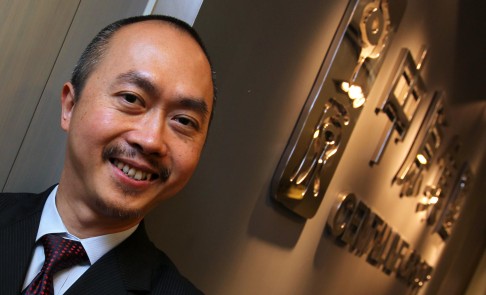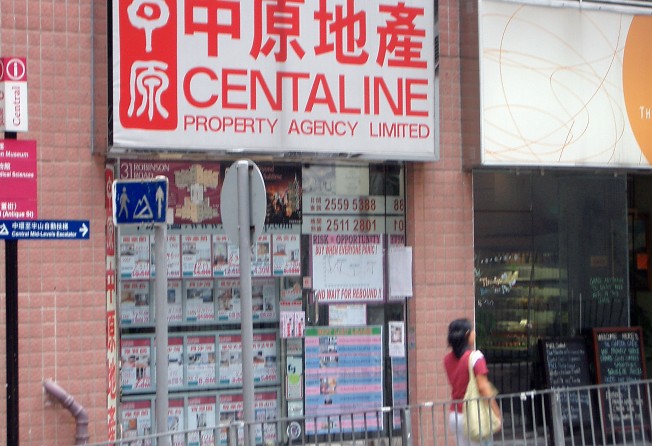
As Centaline China matures, it is taking a leading market share in new cities
Centaline Group chairman Sherman Lai foresees further mainland growth by expanding to more cities and taking on strong competition from the likes of online property agency Home Link

Sherman Lai Ming-kai, 50, took the reins of Centaline Group when founder Shih Wing-ching retired from the chairmanship in January 2010. Lai was previously in charge of Centaline's mainland agency business. His appointment gave a clear signal that the firm would focus on expansion on the mainland. Centaline China is now in 15 mainland cities, so that profits no longer rely exclusively on the four first-tier cities.

Q: How did Centaline Group's commission income fare last year? Was your revenue hit badly after the Hong Kong government imposed a new series of cooling measures on the property market in February last year?
A: Our commission income rose 18.58 per cent to about HK$13.4 billion last year from HK$11.3 billion in 2012. The growth was contributed by the mainland agency business, where earnings surged 50 per cent to 7.48 billion yuan (HK$9.45 billion). The agency business of Centaline Property in Hong Kong was still able to generate a profit, but [its stablemate] Ricacorp Properties recorded a loss of a couple of million dollars.
Q: How was Centaline Group able to maintain a profit when home sales in Hong Kong decreased by 37.7 per cent in 2013?
A: It is because we were able to keep good staff. Brand loyalty is important to the company. But we understand that customers have stronger loyalty to the agents than our brand. We offer a harmonious working environment and opportunities to the staff, which keeps them with us. Our commission rates are similar to those of our competitors in Hong Kong. That is not the reason our staff stay.
Q: What's your forecast for business this year?
A: On the mainland, cooling measures were carried out in the market for 10 years under the last leadership of the central government. But I believe the new leadership that took over last year prefers marketisation of the property market in future. It would then be easy for us to predict the market trend. I'm optimistic on the market outlook. Also, our business in second- and third-tier cities is getting mature. Our profit used to rely on first-tier cities. But now, we have more cities recording a revenue of over 100 million yuan. They used to generate an income of 10 million to 20 million yuan previously. However, our after-tax profit margin was only 8-9 per cent last year, as we put a lot of resources into tackling competition from [online property agency] Home Link. They were aggressive in expansion last year. Our profit margin should be more than 10 per cent.
In Hong Kong, business will be better than last year. Although sales of second-hand homes will stay at a low level, sales of new homes will be better, as more new projects will be released into the market.
Q: How come Centaline treats Home Link, a Beijing-based property agency, as its largest competitor on the mainland? How do you deal with the competition?
A: Previously, we were satisfied with getting a 10 per cent market share in Shanghai. It was already the highest among the agencies. We thought it was the maximum an agency could get, as there are too many agencies in one city. But Home Link achieved a market share of over 30 per cent in Beijing. We couldn't believe the market share of an agency could reach that high. Home Link was aggressive in expansion to other cities from their home base in Beijing in the past two years. So our target last year was to counter their competition by expanding the number of branches in the cities they entered. Our branches in Chengdu increased from 30 to 80 last year. It worked.
Q: How would you describe the current development stage of Centaline on the mainland?
A: We are getting mature. Business in our new cities has begun to pick up and achieved the largest market share in those cities. Some cities, such as Hangzhou [in Zhejiang province] and Zhuhai [in Guangdong], where we previously recorded a loss in the new-home sales business, have begun to improve. Our business in Shandong province has started to make a profit.
Q: What's your target for the company this year?
A: We aim to achieve commission income and service fees of 10 billion yuan from the mainland business. Last year, we spent a lot on expansion to counter the competition. We will focus on increasing our profit this year. But we will continue to increase resources in some cities, such as Beijing, in order to outdo our competitors.
Q: Mainland developers are getting mature in property development, planning and marketing. Does it affect agencies' business in project planning?
A: No. The market is changing because of the popularity of e-commerce. Developers rely even more on agencies, as many of them have no idea how to develop their marketing strategy given this trend. Marketing of projects has to be more "stereoscopic". It involves the use of a variety of social media.
Q: What are the challenges ahead?
A: The market is changing rapidly on the mainland. Our future development will depend on whether our staff can pick up the new skills. If we are able to meet the changes, our company can continue to grow. If we can't, we will be eliminated by the market.